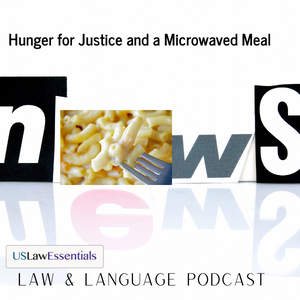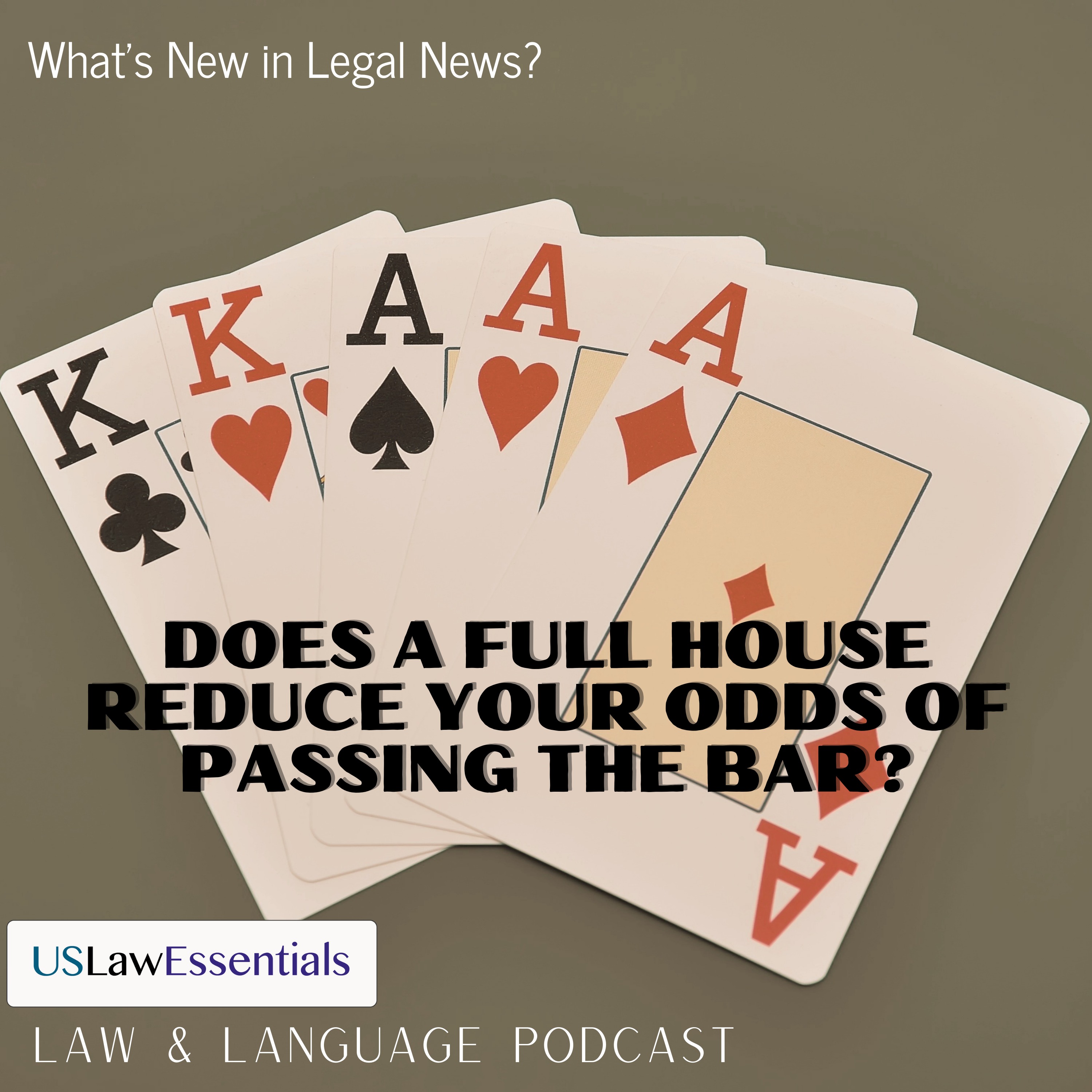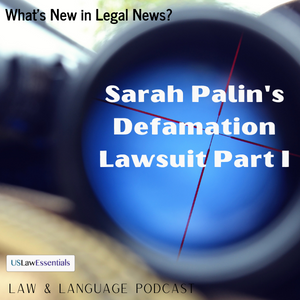Episode Transcript
Speaker 0 00:00:00 Welcome to the U S law essentials law and language podcast, the legal English podcast for non-native English speakers that helps you improve your English, listening, improve your legal English vocabulary and build your knowledge of American I'm Daniel and I'm Steven, and welcome to the law and language podcast. And in this podcast, we talk about law, recent cases, legal news. And we also talk about the language that's associated with these legal events. Now, today, what we're focused on is a Supreme court case, both Steve and I have read part one of the Jones V Mississippi Supreme court decision. And we're going to talk a little bit about the facts of the case, the history of the case and the holding, just based on what we've read in part one. And we'll also talk about the language and perhaps social issues that are associated with it. Yes.
Speaker 1 00:01:08 Okay. So Dan what's happened so far in the first few pages of the case. What, what are the facts and the procedural history in Jones vs. Mississippi.
Speaker 0 00:01:17 Right. So now we're going to try to talk about, I guess what's happened before this came to the Supreme court and it's a sad story. Basically. There's a 15 year old young man and he commits a serious crime. He murders a family member. He murders his own grandfather with, with knives. And this is in Mississippi. And at the time, at the time, Mississippi had a law that if you were a juvenile and you committed this type of crime, you had to go to prison for the rest of your life without the chance for parole. So that's what happened to him. He was convicted and Mississippi state court got sent to prison for the rest of his life without parole. Um, Mississippi state appellate court affirmed that and said, yes, this is the appropriate punishment for you. What happened after that though, was there were a couple of Supreme court decisions and the Supreme court decision said, well, it's okay to sentence a juvenile to life in prison without a chance for parole, but you can't mandate it.
Speaker 0 00:02:36 It can't be required. So this, this defendant got a second chance. He got to go back in front of the state trial court and he got to say, okay, now it's my punishment because you can't make it a rule that I have to go to prison for the rest of my life, with out a chance for parole. And the judge said, okay, I've looked at the case. And I know I don't have to send you to life in prison without a chance for parole, but I think that's the appropriate punishment. So now this defendant was sent back to prison with back to prison for life, without a chance for parole. And he argues that this is unconstitutional and the basis for his argument is you didn't have this finding of incorrigibility. How's that for a, how's that for a summary and procedure. Oh,
Speaker 1 00:03:36 History. Very nice then. Um,
Speaker 0 00:03:40 Sorry about that. But you're, you're, you're very kind. All right. So, um, so, so what
Speaker 1 00:03:44 Do you think the issue is then?
Speaker 0 00:03:47 Uh, what do you think the issue is?
Speaker 1 00:03:50 Um, let's see for the issue. I think it's whether a court can sentence a juvenile to life in prison, um, without parole. Um, and, and whether they can do that without first finding or determining that the defendant is incorrigible or an incorrigibility finding without having an corrigibility finding.
Speaker 0 00:04:14 Yeah. I, I think, I think, I think that that's exactly. That's exactly right. And yeah, I think that's exactly, exactly right. Cause the, um, the judge determined that, okay, you should go to life in prison without a chance for parole, but the petitioner Jones is arguing. There needed to be something else there needed to be some sort of there needed to be some sort of determination of incorrigibility.
Speaker 1 00:04:44 Yeah. Yeah. So, um, and, and what is, uh, what is justice Kavanaugh and the Supreme court majority say about that?
Speaker 0 00:04:51 Well, he, he, he rejects this argument, right. And we just read part one and basically he summarizes his entire argument. And why the majority of the court disagrees with a descent, according to Kavanaugh writing for the majority, you don't get this separate determination of incorrigibility. I gotta say it feels, it almost feels funny saying this, like, okay, it's not something you do every day. Like, okay, well let's determine whether or not this human being is incorrigible.
Speaker 1 00:05:34 Yeah. And it also seems like it's hard to do that. And now we're getting into one of the themes of this case, which is, can you do that for a, a 15 year old human being? Can you determine at that age that somebody is incapable of being good or being redeemed?
Speaker 0 00:05:54 Yeah. Yeah. I think that's right. Cause I think, um, historically, uh, in some of these prior Supreme court cases, there was an argument that, well, it's always going to be unconstitutional to send a juvenile to prison for life, without the chance for parole. But that argument failed. The Supreme court said, no, no, no, you can do that. You can send this juvenile to prison for a life without parole hill he'll have to pass away in prison. But what do you need to decide before that happens? I think some of the subtext here is some people think that perhaps it's really not possible to make a determination of incorrigibility when someone is just 15. What do you think? Yeah.
Speaker 1 00:06:40 I think it's really, really hard to do that. I mean, there's a lot of, I think there's a lot of research out there that shows that, um, people's brains don't fully develop until they're in their twenties or even older. And that, uh, for males in particular, there can be violent phases that tend to, um, and somewhere between, you know, anywhere between age 25 and age after age 40. Um, so given what we know about those kinds of things, it doesn't seem to make a lot of sense. And yet that's not really, I mean, in some ways that's what this case is about, but in terms of the, the legal discussion, it's not about whether or not you can declare somebody it's in cordial to be in cordial. It's about whether there has to be a finding of that first or whether you can just go right past that. Right.
Speaker 0 00:07:31 Right. So, I mean, that's a, that's a real, that's a really good point because the, um, the dissent doesn't really focus here on just the whole psychology about whether or not this is, this is possible because maybe they figured that's not going to be a winning argument anyway, but they really focus on some of these prior cases. And they say under these prior cases, this precedent, you have to do something. And it has to be something within the sentence that shows that the judge has considered all these factors and made a determination of incorrigibility. Or you have to have actually some sort of hearing some sort of proceeding to make this decision.
Speaker 1 00:08:20 That's interesting. You bring up precedent also because one of the dissents main arguments is that the majority is not following prep.
Speaker 0 00:08:29 And this is, this is actually becoming a really big issue now in, in the U S and there's concern that on one side that this Supreme court is ignoring precedent while there's other Supreme court justices who say, we're not ignoring precedent, we're, we're following precedent. You're just simply misreading some of these
Speaker 1 00:08:55 Prior cases. Yeah. It's, it's become a real, um, complicated issue, or it might not seem complicated from one side, but in, if you step back and look at both sides together, it's, it's a complicated issue. Right. And
Speaker 0 00:09:07 I th it raises questions like at what point can the Supreme court say, well, you know what, in this case, we actually disagree with the reasoning of this prior court. And we actually are going to go ahead and, and create new law. But here, here, the majority is really adamant that they're not creating new law and that they are following that they are following precedent. So I guess this is an argument for reading cases carefully. If you could have Supreme court justices disagreeing over the meaning of these prior cases.
Speaker 1 00:09:49 Now, another, another thing that, that, uh, caught our attention in this case, uh, you mentioned to me the word incorrigible, um, which there's a lot hanging on that word about, you know, whether they're going to encourage lability hearing or a finding of incorrigibility was, was completed, or it was done or not. Um, and it, you made a comment to me that in cordial is not a word that, that we use very frequently.
Speaker 0 00:10:17 Yeah. I was, I was sort of laughing about it because I mean, the case itself, isn't funny, but I really don't think I've ever used the word incorrigible. And I couldn't remember distinctly this one event where I heard one person use the word incorrigible to describe certain children. And he was doing it as sort of a humorous criticism, but the word absolutely stuck in my head, because it was such an unusual word to use, to look at the children and say they are incorrigible.
Speaker 1 00:10:52 Yeah. It definitely has a feeling of, of, if not old fashioned sort of a funny duddy, you picture an older person who, who can't relate to children calling children incorrigible because they won't have structured. It has that kind of a feeling. Um, and I think it's notable and the word means irredeemable, or can't be fixed or improved or rehabilitate or rehabilitated. Um, I mean, with, with incorrigibility, you're saying that there's 0% chance that this person will ever become a decent human being who should not be in prison. Um, so I think it's interesting that the court focuses or has come to focus on this word. I mean, it's not in this court in this opinion, didn't, didn't start using this word. It's a word that's been used in court opinions for a number of years. Um, but I think the fact that it's used infrequently gives the, gives the word more impact. It's a word that the court can infuse with. Meaning
Speaker 0 00:11:57 That's a really good point. You were talking about where it's being used infrequently, and then when courts use them, they're infused with meaning. Can you think of other examples that you sometimes see in court decisions that are infrequently using?
Speaker 1 00:12:12 Um, yeah. And I think this happens, especially in, in constitutional law where there's a lot of, of sort of metaphorical terms and the need to sort of create meaning in our, through words or create a word that is heavy with meaning. Um, one word that jumps out to me is, uh, in the famous Roe vs Wade, uh, abortion rights case, um, is the word penumbra and a penumbra is an area on the edge of an eclipse where it's not darker light, but sort of in between, it's sort of like a shadow, um, and meaning sort of a gray area. And the court used this word, um, in, uh, in trying to find a right of privacy, which is not explicitly mentioned in the constitution. They said the first amendment has a penumbra where privacy is protected from governmental intrusion. Um, they said, while it is not expressly included in the first amendment it's existence is necessary in making the express guarantees fully meaningful. So that word penumbra has, has hung around. And it's something that's very closely associated with with, um, Roe vs. Wade. That was the word they use to extend this concept of a right of privacy. Um, and so I think in corrigibility has a, sort of a, a similar, um, special meaning because it's not a word that we use in our daily language or, or that many of us use in our daily life.
Speaker 0 00:13:40 That's interesting because one of the things I know we both tend to do in some of our classes is try to get people to use different words to express the same thing in English. So you had, you had offered, um, as alternatives for incorrigible irredeemable, someone who can't be improved or rehabilitated, if we're going to try to express like penumbra in different words, w w what would you use?
Speaker 1 00:14:14 I guess I'd say there's like a, there's a gray area, or there's like a shadow or an overhang maybe, or, or an emanation that there's something emanating it's sort of on the edges, but still, um, still part of the core thing. Oh, okay.
Speaker 0 00:14:34 And that's, that's good. I was thinking something like, um, implied, right? So you have an express, right. But there are certain rights that are implied as a result of that express, right?
Speaker 1 00:14:44 Yeah. I like implied. I think that's a much simpler explanation than the one. I just
Speaker 0 00:14:48 W were there any words in this case that actually sort of new to you? Because there was one word that was new to me.
Speaker 1 00:14:55 Um, collateral review, have you come across that?
Speaker 0 00:15:00 That's a good one. Yeah. Collateral review is something that I, I, I sort of knew, but it's not used commonly and review here just means we're an appellate court looks at a decision by a prior court and here collateral review means where a federal court, it's not a direct appeal, but our federal court goes back and reviews a state court decision often based on some sort of Supreme court decision or some sort of constitutional right.
Speaker 1 00:15:35 Oh, well, that's helpful to know. So which word do you think you'll use more frequently incorrigible or collateral review?
Speaker 0 00:15:43 Neither. I don't think I'm comfortable using, using either word. Um, but I suppose I'll, I'll stay away from incorrigible because that that'll make me sound like a fuddy-duddy collateral review might make me sound smart. Okay. Did you hear the word Sentencer before? S E N T E N T E R?
Speaker 1 00:16:03 No. You know what I mean? It, it sounds like a word when I hear it. It's not hard to understand, but I, but as you mentioned it, I don't think I've ever come across. It. It kind of reminds me of when George W. Bush used the term decider, it sounds like a word. It was not really a word, and now it's become a word, but what, what about Sentencer?
Speaker 0 00:16:24 Well, it's, it was, it was actually completely new to me, but like you, I could tell in the context that it's what it, what it means. It's the person who gives the sentence. It's the person who decides the punishment and
Speaker 1 00:16:40 Sorry. So the judge in this case,
Speaker 0 00:16:42 Right? Right. So in this case it would certainly be the judge. So when I was trying to rephrase it, as we do in the, in the course, I said, okay, the judge. But then I realized, technically speaking, that might not always be right. Sometimes juries are given the power to decide the punishment. So in some cases, the jury can be the Sentencer or the Punisher with the Punisher. Sounds like such a funny word, but usually I think we would say the judge is the center, the Sentencer. Cause he's the one who gives the sentence.
Speaker 1 00:17:18 Yeah. The Punisher sounds like a professional wrestler name.
Speaker 0 00:17:25 Yeah. I it's a and again, it was just such an, such an unusual word. It struck me. Of course, everyone else might know it, but it was, it was a new word for me.
Speaker 1 00:17:34 Um, I I'm, I'm thinking about the field of linguistics and what, what a sentence, or might refer to, what would it be? I dunno, I guess a person who writes sentences, that's not something we would, that's a writer. So I'm trying to think if there could possibly be any other, other term for it.
Speaker 0 00:17:55 So, Hey, Steve. Um, all right. Speaking of sentences, we might've been sentencing for just a little bit too long here, but thank you very much. It was really interesting speaking with you.
Speaker 1 00:18:03 Yeah, that was, that was really fun. Yeah. Um, and, and, uh, and a new use of the word sentencing. Terrific.
Speaker 0 00:18:10 All right. Thanks very much for joining the U S law Central's lawn language podcast, and we look forward to seeing you again, talk soon. Bye. Now,


